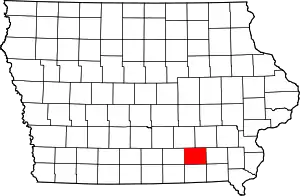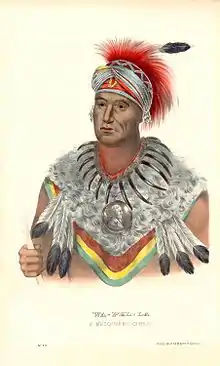Wapello County, Iowa
Wapello County is a county located in the U.S. state of Iowa. As of the 2010 census, the population was 35,625.[1] The county seat is Ottumwa.[2] The county was formed on February 17, 1843 and named for Wapello, a Meskwaki chief.[3]
Wapello County | |
|---|---|
 The courthouse in Ottumwa | |
 Location within the U.S. state of Iowa | |
 Iowa's location within the U.S. | |
| Coordinates: 41°01′46″N 92°24′32″W | |
| Country | |
| State | |
| Founded | 1843 |
| Named for | Wapello |
| Seat | Ottumwa |
| Largest city | Ottumwa |
| Area | |
| • Total | 436 sq mi (1,130 km2) |
| • Land | 432 sq mi (1,120 km2) |
| • Water | 4.2 sq mi (11 km2) 1.0%% |
| Population (2010) | |
| • Total | 35,625 |
| • Estimate (2018) | 35,205 |
| • Density | 82/sq mi (32/km2) |
| Time zone | UTC−6 (Central) |
| • Summer (DST) | UTC−5 (CDT) |
| Congressional district | 2nd |
| Website | www |

Wapello County is included in the Ottumwa, IA Micropolitan Statistical Area.
Geography
According to the U.S. Census Bureau, the county has a total area of 436 square miles (1,130 km2), of which 432 square miles (1,120 km2) is land and 4.2 square miles (11 km2) (1.0%) is water.[4]
Major highways
Adjacent counties
- Mahaska County (northwest)
- Keokuk County (northeast)
- Jefferson County (east)
- Davis County (south)
- Monroe County (west)
Demographics
| Historical population | |||
|---|---|---|---|
| Census | Pop. | %± | |
| 1850 | 8,471 | — | |
| 1860 | 14,518 | 71.4% | |
| 1870 | 22,346 | 53.9% | |
| 1880 | 25,285 | 13.2% | |
| 1890 | 30,426 | 20.3% | |
| 1900 | 35,426 | 16.4% | |
| 1910 | 37,743 | 6.5% | |
| 1920 | 37,937 | 0.5% | |
| 1930 | 40,480 | 6.7% | |
| 1940 | 44,280 | 9.4% | |
| 1950 | 47,397 | 7.0% | |
| 1960 | 46,126 | −2.7% | |
| 1970 | 42,149 | −8.6% | |
| 1980 | 40,241 | −4.5% | |
| 1990 | 35,696 | −11.3% | |
| 2000 | 36,051 | 1.0% | |
| 2010 | 35,625 | −1.2% | |
| 2018 (est.) | 35,205 | [5] | −1.2% |
| U.S. Decennial Census[6] 1790-1960[7] 1900-1990[8] 1990-2000[9] 2010-2018[1] | |||
2010 census
The 2010 census recorded a population of 35,625 in the county, with a population density of 82.5016/sq mi (31.8540/km2). There were 16,098 housing units, of which 14,552 were occupied.[10]
2000 census

As of the census[11] of 2000, there were 36,051 people, 14,784 households, and 9,801 families residing in the county. The population density was 84 people per square mile (32/km2). There were 15,873 housing units at an average density of 37 per square mile (14/km2). The racial makeup of the county was 96.28% White, 0.93% Black or African American, 0.28% Native American, 0.65% Asian, 0.02% Pacific Islander, 1.05% from other races, and 0.79% from two or more races. 2.22% of the population were Hispanic or Latino of any race.
There were 14,784 households, out of which 28.80% had children under the age of 18 living with them, 52.70% were married couples living together, 9.90% had a female householder with no husband present, and 33.70% were non-families. 28.20% of all households were made up of individuals, and 13.40% had someone living alone who was 65 years of age or older. The average household size was 2.37 and the average family size was 2.89.
In the county, the population was spread out, with 23.30% under the age of 18, 9.70% from 18 to 24, 26.00% from 25 to 44, 23.30% from 45 to 64, and 17.80% who were 65 years of age or older. The median age was 39 years. For every 100 females there were 94.80 males. For every 100 females age 18 and over, there were 91.70 males.
The median income for a household in the county was $32,188, and the median income for a family was $39,224. Males had a median income of $31,346 versus $21,286 for females. The per capita income for the county was $16,500. About 9.40% of families and 13.20% of the population were below the poverty line, including 18.00% of those under age 18 and 7.90% of those age 65 or over.
Communities
Unincorporated communities
- Ashland
- Bladensburg
- Dahlonega
- Dudley
- Farson
- Munterville
- Phillips
- Pickwick
- Ottumwa Junction
- Rutledge
Townships
Population ranking
The population ranking of the following table is based on the 2010 census of Wapello County.[12]
† county seat
| Rank | City/Town/etc. | Municipal type | Population (2010 Census) |
|---|---|---|---|
| 1 | † Ottumwa | City | 25,023 |
| 2 | Eddyville (partially in Mahaska and Monroe Counties) | City | 1,024 |
| 3 | Eldon | City | 927 |
| 4 | Agency | City | 638 |
| 5 | Blakesburg | City | 296 |
| 6 | Kirkville | City | 167 |
| 7 | Chillicothe | City | 97 |
Politics
| Year | Republican | Democratic | Third Parties |
|---|---|---|---|
| 2020 | 60.9% 9,516 | 37.2% 5,821 | 1.9% 296 |
| 2016 | 57.5% 8,715 | 36.9% 5,594 | 5.6% 840 |
| 2012 | 43.1% 6,789 | 54.9% 8,663 | 2.0% 318 |
| 2008 | 41.8% 6,663 | 55.3% 8,820 | 2.9% 457 |
| 2004 | 44.3% 7,403 | 54.6% 9,125 | 1.1% 179 |
| 2000 | 41.7% 6,313 | 55.2% 8,355 | 3.1% 471 |
| 1996 | 32.7% 4,828 | 57.1% 8,437 | 10.2% 1,505 |
| 1992 | 30.2% 4,852 | 53.9% 8,670 | 15.9% 2,561 |
| 1988 | 34.1% 5,350 | 64.9% 10,177 | 0.9% 146 |
| 1984 | 39.9% 7,098 | 59.2% 10,545 | 0.9% 157 |
| 1980 | 42.3% 7,475 | 50.5% 8,923 | 7.2% 1,270 |
| 1976 | 39.3% 6,786 | 59.4% 10,249 | 1.4% 233 |
| 1972 | 51.2% 9,301 | 45.9% 8,348 | 2.9% 522 |
| 1968 | 42.0% 7,825 | 50.3% 9,375 | 7.8% 1,447 |
| 1964 | 28.3% 5,524 | 71.5% 13,971 | 0.3% 51 |
| 1960 | 49.8% 11,036 | 50.2% 11,116 | 0.1% 15 |
| 1956 | 48.7% 10,401 | 51.3% 10,960 | 0.1% 20 |
| 1952 | 52.2% 11,571 | 47.2% 10,449 | 0.6% 130 |
| 1948 | 41.5% 7,875 | 57.1% 10,841 | 1.4% 260 |
| 1944 | 43.2% 8,244 | 56.2% 10,732 | 0.6% 113 |
| 1940 | 43.0% 9,039 | 56.6% 11,880 | 0.4% 87 |
| 1936 | 41.3% 7,647 | 57.1% 10,578 | 1.6% 287 |
| 1932 | 42.5% 7,256 | 55.7% 9,504 | 1.9% 316 |
| 1928 | 66.1% 11,586 | 33.1% 5,793 | 0.9% 149 |
| 1924 | 57.0% 9,870 | 17.5% 3,039 | 25.5% 4,420 |
| 1920 | 68.0% 9,884 | 28.4% 4,131 | 3.6% 522 |
| 1916 | 47.7% 4,398 | 43.3% 3,994 | 9.1% 837 |
| 1912 | 32.5% 2,755 | 36.6% 3,102 | 30.9% 2,613 |
| 1908 | 50.7% 4,541 | 41.6% 3,724 | 7.8% 694 |
| 1904 | 60.6% 4,912 | 30.5% 2,473 | 8.9% 720 |
| 1900 | 53.2% 4,742 | 43.8% 3,902 | 3.0% 268 |
| 1896 | 50.8% 4,319 | 47.5% 4,041 | 1.8% 150 |
See also
- Big 4 Fair Art Hall, located at the Wapello County Fairgrounds
- Wapello County Courthouse
- National Register of Historic Places listings in Wapello County, Iowa
References
- "State & County QuickFacts". United States Census Bureau. Retrieved July 20, 2014.
- "Find a County". National Association of Counties. Retrieved June 7, 2011.
- Wapello County
- "US Gazetteer files: 2010, 2000, and 1990". United States Census Bureau. February 12, 2011. Retrieved April 23, 2011.
- "Population and Housing Unit Estimates". Retrieved June 20, 2019.
- "U.S. Decennial Census". United States Census Bureau. Retrieved July 20, 2014.
- "Historical Census Browser". University of Virginia Library. Retrieved July 20, 2014.
- "Population of Counties by Decennial Census: 1900 to 1990". United States Census Bureau. Retrieved July 20, 2014.
- "Census 2000 PHC-T-4. Ranking Tables for Counties: 1990 and 2000" (PDF). United States Census Bureau. Retrieved July 20, 2014.
- "Population & Housing Occupancy Status 2010". United States Census Bureau American FactFinder. Retrieved June 11, 2011.
- "U.S. Census website". United States Census Bureau. Retrieved January 31, 2008.
- https://www.census.gov/2010census/
- Leip, David. "Dave Leip's Atlas of U.S. Presidential Elections". uselectionatlas.org. Retrieved 2018-04-28.
External links
| Wikimedia Commons has media related to Wapello County, Iowa. |
